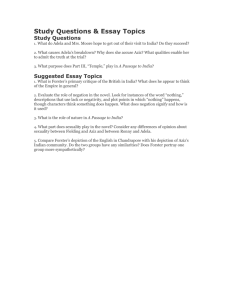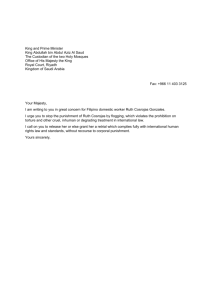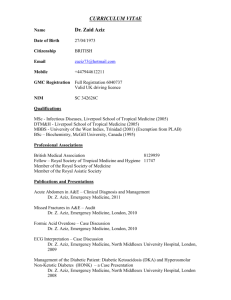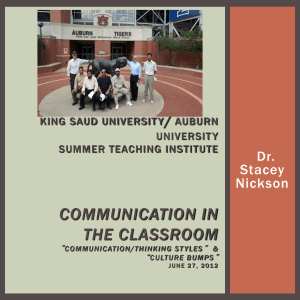Aziz Ishak and the Anti-British Spirit
advertisement
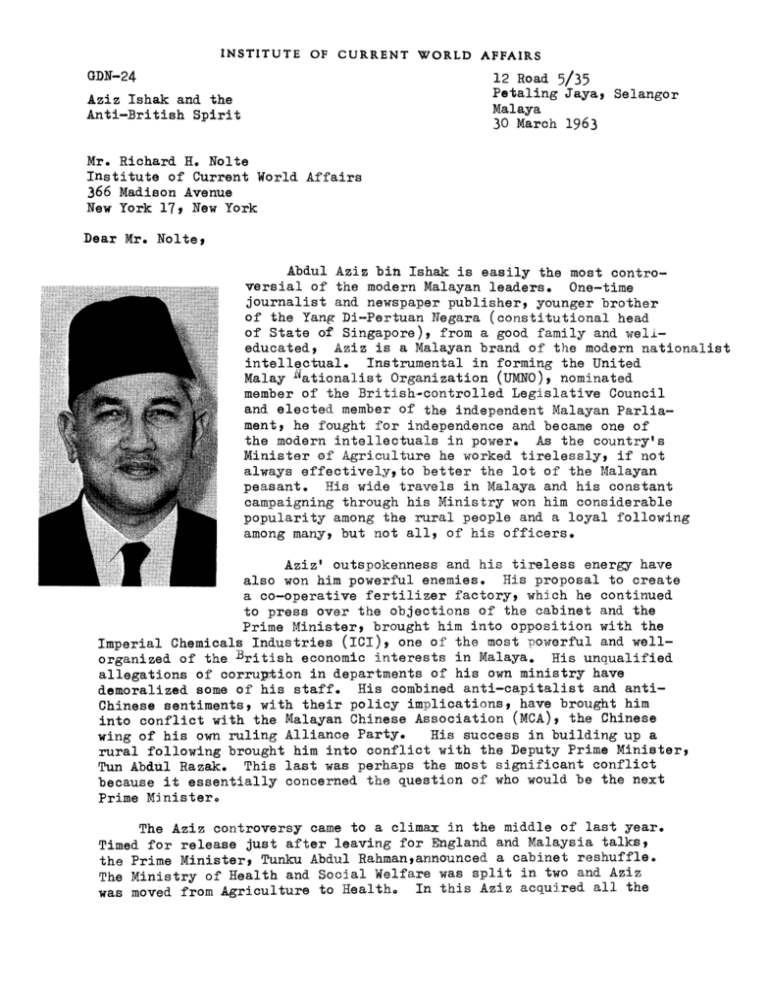
INSTITUTE OF CURRENT WORLD AFFAIRS x o 5/B5 GDN-24 Petaling Jaya, Selangor Malaya SO March 196S Aziz Ishak and the Anti-British Spirit Mr. Richard H. Nolte Institute of Current World Affairs $66 Madison Avenue New York 17, New York Dear Mr. Nolte, Abdul Aziz bin Ishak is easily the most controversial of the modern Malayan leaders. One-time journalist and newspaper publisher, younger brother of the Yang Di-Pertuan Negara (constitutional head of State of Singapore), from a good family and welleducated, Aziz is a Malayan brand of the modern nationalist intellectual. Instrumental in forming the United Malay Nationalist Organization (UMNO), nominated member of the Britishcontrolled Legislative Council and elected member of the independent Malayan Parliament he fought for independence and became one of the modern intellectuals in power. As the country’s Minister of Agriculture he worked tirelessly, if not always effectively, to better the lot of the alayan peasant. His wide travels in Malaya and his constant campaigning through his Ministry won him considerable popularity among the rural people and a loyal following among many, but not all, of his officers. Aziz’ outspokenness and his tireless energy have also won him powerful enemies. His proposal to create a co-operative fertilizer factory, which he continued to press over the objections of the cabinet and the Prime inister, brought him into opposition with the Imperial Chemicals Industries (ICI), one of the most powerful and wellorganized of the British economic interests in Malaya. His unqualified allegations of corru ltion in departments of his own ministry have demoralized some of his staff. His combined anti-capitalist and antiChinese sentiments, with their policy implications, have brought him into conflict with the Malayan Chinese Association (MCA), the Chinese His success in building up a wing of his own ruling Alliance Party. with the Deputy Prime Minister, conflict into him brought following rural Tun Abdul Razak. This last was perhaps the most significant conflict because it essentially concerned the question of who would be the next Prime Mnistero The Aziz controversy came to a climax in the middle of last year. Timed for release just after leaving for England and Malaysia talks, the Prime Minister, Tunku Abdul Rahman,announced a cabinet reshuffle. The Ministry of Health and Social Welfare was split in two and Aziz was moved from Agriculture to Health In this Aziz acquired all the GDN-24 -2- problems of too few doctors and hospitals and was not even allowed the patronage potential of welfare grants Aziz balked He announced publically that the Prime Minister had not informed him of the change, and he could not accept it in any case. In England the Malaysia talks were successfully concluded aad the Tunk returned to Malaya in a blae of glory. The success sealed Aziz’ fate It eclipsed the Aziz affair and gave the Tunku a sufficient margin of power to allow him to force Aziz out of the cabinet without any repercussions In January of this year Aziz launched a strong attack on the government’s entire development program, on its interference in the Brunei rebellion, and on its failure to maintain fri@ndly relations with Indonesia. This gave the party leaders an opportunity which they promptly took to drum Aziz out of their sacred and secure ranks. This month was Aziz first session in Parliament as an independent member of the opposition. He made a strong appeal, one that just might be successful, to rally the opposition members on an anti-Malaysia platform. Aziz argues, along with the Indonesians, the Brunei rebels, some Filipimos, and Pravda., that Malaysia is merely a British attempt to protect +/-ks interests in the area. Conflict with Indonesia over Malaysia, he asserts, can only help the British. The old "divide and rule" slogan is revived It was at this point that I met Aziz for an interview in the Parliament library It was during a morning recess in the session, in a setting that Was almost bizarre The entire library is contained in a room 0 feet by 0 feet, boasting a new air-conditionero In one corner sat a cabinet minister with his bare feet resting high on a table, apparently in an attempt to remove some pressure. As Aziz and I talked, we received astonished stares from the opposition members and embarrassed glances from Alliance back-bencherso Normally one does not talk to a recent exile At first Aziz was reticent and indirect in his replies Gradually he warmed Shaken by the cold of exile he obviously missed the warm glow of his previous publicity and power was willing to come to anyone Some of this returned when someone seek his views In what follows I shall paraphrase Aziz’ answers to some of my questions, trying as much as possible to keep the original flavor of his discussion However controversial he is, Aziz is a popular and sincere man. Many of the entiments he expresses are popular sentiments and could provide the base for future political alignments and actions. W,ha_t d.o .you see as the, ,coun!..ry.’ s m.j.or econ,o,mi.c ,p ro.b,.l..e m? To understand this you must go back to ,erdeka (independence). We were new in government. We had no experience. We didn’t know how to run a country. Then, too, we were busy with other things. Most of and parties and our ministers were terribly busy with celebrations had our British still We like. the and designing new cabinet uniforms to them. They listened we so inexperienced were advisers, you know. We and we do told us what to knew how to run the government so they followed. So you see there has been no real change What we have now GDN-24 - is just a continuation of the old policy He allowed me to make the inference, "Do you mean the British are still in control?" Exactly and with that there can be no real change, no real solution to our problems, no real end to rural poverty. What d,o .you. fee!. ,,i.s the .ma.jor .cause ,o,f ,rural p,o,v,,ertr? Well, exploitation; by the middlemen and the foreign companies That’s why I had to leave the cabinet. My urea (fertilizer) project went against the interests of ICI. They are powerful people, you know and they got the Tunku to agree. Why, when I came into the cabinet I tried to find out the world prices of fertilizer and I couldn’t get the information. It was only when I went on tour that I found we were paying far too much. Then, in the work of my ministry we made the people fertilizer conscious and I thought we should produce the fertilizer here. The Tunku didn’t agree, but my project was sound. We had FAO experts and technicians from India West Germany and France and they all agreed. The facts are there for anyone to see. When we started planning for the factory, the price of fertilizer in Malaya dropped $0 a ton, then later it dropped another $0 a ton. With a factory of our own we could sell both the fertilizer and the by-products. This amo+/-mgas is a by-product. We could produce it for $00 a ton and we now pay $1100 a ton for it Th sales of this alone would have netted our plt $4 million a year. Why, we could have given the fertilizer away free! And the people were behind me. We collected $2 million from the farmers in subscriptions for this co-op. Tell me what other country in the world could show such a record from its poor farmers. I had also heard that yOU w.ere..f.orced..out o.f t..he..ca.bine.t bec_.us.e .of .y.our conflict with the MCA and the Chinese rice millers in Perak _a_nd Aziz had induced-the t-w0- -state governments, which control licencing, to grant monopoly powers to co-operaive mills in these two important rice growing states. Some observers here argue that the MCA was forced to make a very strong stand on this issue within the Alliance executive committee The state governments did reverse their decisions, on the grounds that it was unconstitutional to refuse to renew any licence, an important legal protection for the Chinese If Aziz had succeeded it seems likely that the MCA would have lost a great deal of the valuable support it brings to the Alliance, p.e...nan’._’ ’How.’..%mp’.r.’’n’t w..sl..this? Yes, that was important. You must understand, though, that exploitation is not a communal (racial) matter. Middlemen are the same the world over; they live by exploiting. It is just that in Malaya most of the middlemen @re Chinese. There was no legal problem in the moe, however it was not unconstitutional We did the same thng in Selangor and Malacca and no one contested it. It was only when we moved into their real interests that they became frightened But you can look it up for yourself; there is nothing unconstitutional about it. (I did look it up; the protection for the licencee is quite clearly stated in the constitution.) :!)N-24 -4- The important thing of course, is that here the middlemen are backed by the British companies The Tunku says we are in partnership with the Chinese so we cannot move against them. The rice dealers could have come into the co-op, of course, but they wou’..l.dn’t have the same power they had as private dealerse In this way you see, we ran into strong opposition with Tan Slew Sin (Minister of Finance and Chairman of the MCA)o Why__ w.a.s .the.. Comm..unity_ .De.v..elopment Program moved out of.. y.0u..r inistry .and into the Ministry of Rural Devel.0_Pment? In 198 Aziz began a community development regram. Though there was little activity, the program did appear to have some success and it gained some popularity for Aziz. Late in 1959 it was moved to the Prime Minister’s Office and then almost immediately to the Ministry of Rural Development where it died early in 1960. Well, community development was a great success here. I brought the idea from India you know. We had 160 kampongs in Kelantan doing wende.r.-Ul things You could see the results in six months. We even had a seminar here in Kuala Lumpmr with a U.N. expert. But apparently some people thought I shouldn’t do it all alone and get all the credit for it so we couldn’ get any support for it. When I saw that I volunteered to give it to the PM. (Another version has it that Aziz gave up the program only very reluctantly.) Since then it has died because no one understands it. We proved it works even with very limited resources but no one else underst.ands it so nothing has come of i,n the.. a ,,l ,l, . gat ion that you._w#re. foo,,,ed .out of..t...h.e co.nf.li..c...t. with Tun Razak., exemplified .__in the i_ssu e e.f .the...C.ommun_ity .Development p.rogramt ..O.v.er who....i.s to_ be_ the.., next Is t.he.re ,.a.n.y,.....t.ruth cabinet b_e.c.a.use ..._of yo__u.r. Prime Minister? Aziz threw back his hed and &aughed! it seemed Aziz.... little forced. man of the people... I never had any such ambitions or any such conflict. The thing is that I have always tried to work hard for the peoplee Even from my days as a journalist I always tried to do everything to give a lift-up to the people Perhaps Tun Razak felt I was.’, jetting too popular because of my work How fa_r ,back does, rour c,q,n, flict.. ,wi.t.h .T..u.n .R._za.k, go.? Well, back to the first days of the cabinet. As I said, some people were more interested in designing new uniforms for the cabinet, but I wanted to get on with the job. (This was the period when Tun Razak, as Minister of Education, was hammering out Malaya’s first unified education policy and doubling the budget for schoolso) ..a.n n Why .has there ,b,e.e,n, mention of land r_efor in Ma!a_Ya? !.s, ,,the,re truth in the assertion t_h..at this is beca..use .t.he UMN.0 .is b...as.e d .UP.0 n _landed en_t i.’n Kedah and J..ohore?_ No that ownership is negligible. It is really because of British interests. You know there are about 5 million acres of cultivated land in Malaya and only 1,5 million acres are owned locally Of course they don’t want any talk of land reform; and we have pledged ourselves to protect the foreign capitalists, (In this case Aziz’ perception is somewhat blurred. The 1.5 million acres he talked of is owned by Malays. The foreign ownership amounts to about 1.5 million acres, primarily of rubber plantations, The rest is owned by Malayan Chinese and Indians, Azi dismissal of the landed gentry also seems less than objective,for a and more of tenancy in the important study of his own ministry shows rice areas of the northeast and the northwest; almost all of this land is Malay reservation and is owned by Malayso) 50% What k_nd of vision of the future do you have...for. Ma.lay..aT.. What. ,rg_A......t_.ip_._.O_’._’r’_.,d_uctioU wouildy.ui" ’l’.’e’, t,o goes to the peop&e see -6- GDN-24 Ne must, of course industrialize more and more rapidly. Agriculture should be in the hands of people with co-operative credit and marketing so they can get a fair return for their labor, Industry could be in three parts In some industries the private capitalists will do best and their investments should be protected. In other areas the state should take a hand to protect the interests of the people. Finally there should be an area reserved for ceoperatives; industries where all the people could sare in the ownership, the profi,% and the control making the industry really for the people of the country. Of course, I can’t divulge all of my ideas in detail now; it is too early In" fact in all I have done I am probably ahead of my time. We may not be ready for this now but someday we shall The whole system has not changed and the little man is still very much on the bottom. You cannot ignore his wishes for very long or you will have a real communis revolution here D y0u...a..re..ahe.ad of. your time in_ .the_ sa__me._way...,Dat.0....0._n.n time in advocating non, racial _politioa,! pa.rti...e..s.? you, feel .a.h.ea..d,. of..his .was. No Dato 0nn had no experience in government. He had some good ideas, and he tried to put them into practi(C)e but he was never in the elected government so he had no experience with the pressures one is under in trying to change this kind of colonial country. Abdul Aziz bin Ishak is undoubtedly an int..elligent and sincere man. His concern with the exploitation by British companies (he began by talking about foreign companies, but switched to British companies as he warmed up)i significant. I had expected him t"0 talk of exploitation; in the eyes of the f4alays it is the dominant cause of rural poverty. However, I had expected him te talk of exploitation by the Chinese. Within the Alliance Party anti-Chinese sentiments are kept under control by the requirements of the accommodation that has up to now been successful in keeping the party in power. Outside of the party, however, a politician can always count on gaining at least a local following by taking a racialist line. Aziz did in fact move in this direction in his January attacks on government. At that time Tan Stew Sin was the major target of his attack. I was somewhat surprised at this strong anti-Brltish line Aziz took with me It seems to have two major sources In the first place it fits well with his current attack on the government through opposition to alaysiaQ One really vulnerable aspect of this policy is the protection it gives to British economic interests This does smack of neo-colonialism at a time when any form of colonialism is still the rallying point for a good deal of mass political opposition. It would be wrong, however, to see in Aziz’ anti-British sentiments These only the passing expedient of an opportunistic politician. vague group that among especially sentiments are pervasive and popular, sentiments represent in part of people called the intellectuals. These G:D:[’,]-24 -’7- a vague sense of resentment against the imbalance of this still largely outwardly oriented plantation economy They also represent a sense of frustration in leaders experiencing difficulties in changing the society te make a better life for the Malayans Part of the difficulties come from the indigenous resistance of the society to directed change, but part also comes from the obstacles placed in the way of- change by powerful and well organized foreign economic interests It may well be that the most severe difficulties derive from the indigenous resistance rather than from the foreign obstacles. However, the foreign obstacles are more visible and mere onerous and thus are mere available as symbols of mass political a.ctivity than is the indigenous resistance. One could do away with Aziz (and he will have to tread a delicate path to avoid being put away), but this would not end the f.rustration or the anti-British economic sentiments. I came away from the interview with Aziz asking myself two questions. lo Will the anti-British economic sentiment produce a new political alignment and new political actions? 2o Can the foreign obstacles to change be removed or reduced without obstructing the process of growth itself? To both questions I would give the same answer: it is both possible and likely. If we were concerned with the Federation alone, a new alignment would be highly likely. The delicate demographic balance of races Malays) means that for soma time to in the Federation (40% Chinese, come, perhaps another generation, only an alliance of basic.ally ra.cial political parties will be able to win a national election The current Alliance Party has been successful enough to warrant predictions of a long.life for ito Such a racial alliance requires an accommodation of diverse economic interests, some of which are similar to those of the f.orein .c.om.nies. A haw alignment aainst the foreign_ companies would have to be built upon a combination of urban workers unrest and peasant unrest over land. Within the Federation both types of unrest are found, but neither is sufficiently strong or well led to produce a new political party. 50% With the advent of Greater Malaysia and the entrance of Singapore all this changes Singapore does have a strong and well led base of urban unrest that could provide a powerful nucl6us for an effective left-wing opposition party There is some speculation here that Aziz will join ranks with Lew Kuan Yew, the Socialist Prime inister of Singapore, to build such a new national opposit&on party. If this happens Aziz will have to temper his anti-Malaysia line, which in any case does not provide e long term base for opposition. The prospects are that such a party will be relatively moderate with respect to the foreign companies, but will demand more of them than the present government..demands. It also seems likely that such a party would provide the kind of healthy opposition Malaya needs to speed up both its economic and political development The positive answer to the second question derives from the observation that the approach of the alayan government to all questions is a piecemeal too, is partly the result of the accommodation required approach. This D-24 -8- by the delicate racial balance In my estimation this s Iso the most useful approach to economic development, especially if one wants to stimulate growth without incurring disastrous consequences The case of Indonesia is both close at hand and very instrctiveo That country managed to get rid of foreign companies, but only with a policy that produced a thoroughly broken economy in the short run and a far more serious dependence upon foreign capital in the long run. What appears to be required in Malaya is something in the order of tariff and tax incentives, bringing pressure upon the foreign companies to invest more and a more vigorou policy and set of institutions to mobilize local capital for industrial investment All three of these policies are already in operation in Malaya, and though they move slowly enough, they do seem to promise a good future. It is this kind of activity that might be accelerated by the creation Of a good left-wing opposition party@ Azlz may well be ahead of his time, a voice crying in the wilderness of political and economic struggle and growth. There can be no doubt, however that he is a voice and that he may grow stronger in the future. There is a residue of anti-colonial economic sentiment here that will not be eradicated until the country and the economy grow up a good deal more While the sentiment exists it will always provide a rallying pInt for the intellectuals and cmrtain moe progressive politicians. Aziz is only one manifestation of this sentiment. In the course of the next year, with the coming of Malaysia and the 1964 eections, we shall have an opportunity to see how strong this sentiment is in Malaya. Sincerely "Ga Received in New York April 8, 1963o Ness
